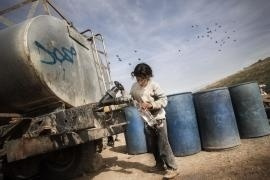
At 2019 Human Rights Festival, of which Gariwo is a media partner, organized at Milan Triennale Exhibition Centre, several issues such as the environment, climate and conflicts over water, were dealt with by Daniele Bocchiola, Professor of Engineering for the Environment and Territory at Milan Politecnico University, and by Emanuele Bompan, journalist, of the Water Grabbing Observatory. Such topic is often considered to be more emotional than scientific, but there are some figures that cannot be ignored and that we have known for some time. Considering the current situation, if no changes are made to consumption patterns and emissions into the atmosphere, temperatures may grow by up to 4 - 5° on average on the earth by the end of the century. This means that, following ice melting, sea level may increase by approximately one metre and a half: half of Holland would be submerged and one third of Bangladesh would disappear, just to mention a couple of examples. Speaking of Italy, the surface of Italian glaciers has already decreased by 50% and since the beginning of this year and until the latest estimates, half of average seasonal rain has fallen on the Po river. There is more, because a natural issue of water distribution exists: almost all water accumulated in the ice is in the South Pole and in Greenland, while a fifth of all global fresh water is in Lake Baikal in Russia and is certainly not easy to be used.
"Speaking about Climate Change is no longer so comprehensive and we should rather speak of Global Change", says Bompan, because climate change impacts on all existing balances. Prolonged spells of drought ruin crops, forcing people to move in search of food and new land, many of whom – especially those who live in economically weaker countries that are more affected by poor resources - seek their fortune in the suburbs of overcrowded cities or in other rural areas, nearly always uselessly. They are the so-called climate migrants, doomed to increase significantly. It is easy to imagine how, in difficult places around the world, a decrease in areas having water and food resources compels the population to receive a smaller portion of these, which causes new conflicts or exacerbates pre-existing ones. If all this is complemented by political instability of countries affected by physical and social changes and authoritarian governments taking land and water from inhabitants to build profitable dams and crops, it is not hard to imagine devastating consequences. Recently, the Mekong river, for example, has been used to build a number of mega-dams (39 or more), which are in progress, as reported by Emanuele Bompan, who went there with Water Grabbing team. This river runs through China, Burma, Thailand, Laos and Vietnam, all governed by authoritarian regimes. Thousands of inhabitants have been forcibly deported from their land receiving negligible compensation or having to resettle in other specially organized areas, having poor resources and an unbearable climate. Some experts even assume that this situation could lead to "the first major river war". Furthermore, the disappearance of the Aral Sea is causing a conflict between Kazakhstan, Uzbekistan and Kyrgyzstan, while Israel, after Oslo negotiations, actually controls Palestinian water sources, which, in some Bedouin areas, spend 50% of revenues stemming from animal breeding to transport water.
How should we act then? It is certainly to be noted that water resources exist but are used in the wrong way. Just think that most water is used in farming and livestock, but 30% of food produced in the world and presumably, 20% of water used are wasted. We are basically drying out populations to produce food that we then throw away. Italy, ranking third in the world for bottled water consumption, is a paradoxical example, as water supplied by public aqueducts is perfectly drinkable throughout the country. Bompan claims that the possible solution is culturally and technologically better management of water resources and clean energies to replace polluting resources – in that technologies and strategies to do so already exist. It is important to understand that also individual actions have an environmental impact and it is crucial to legally guarantee the right to water and the right to the environment as constitutional principles of each country and as international laws.
We may say "We can fix the planet" (we can solve the issues of the planet), quoting Christiana Figueres, UFCCC Executive Secretary and architect of Paris agreements, who claims in an article published on Haaretz that it can be done using 3 elements: trees, electrical technology and transport.

